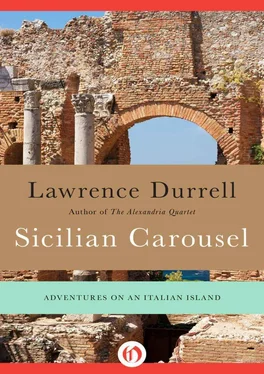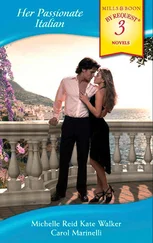Dutifully we prowled the duckboards while Beddoes, who had culled a whole lot of Latin words from the Blue Guide, made up a sort of prose poem from fragments of it which he murmured aloud to himself in a vibrant tone of voice. Thus:
And so we enter the Atrium
By its purely polygonal court
To the left lies the Great Latrine
Ladies and Gents, the Great Latrine
For those who are taken short
But the marble seats are lost
Yet ahead of us is the Aediculum
Giving access to the Thermae
The vestibule can be viewed from
the Peristyle
Do not smile.
Next comes the frigidarium
With its apodyteria
Leading onwards with increasing hysteria
To the Alepterion
Between tepidarium and calidarium
Whence into a court where the Lesser
Latrine
Waits for those who have not yet been
In construction sumptuous
As befitted the Imperial Purple
But here the Muse punished him and he wobbled off a duckboard and all but plunged down upon one of the more precious tessellations, to the intense annoyance of Roberto and the collective disapproval of the Carousel. The dentist’s lady seemed particularly shocked and enraged and flounced about to register her disapproval. “That guy is sacrilegious,” she told her companion with a venomous look at Beddoes who seemed only a very little repentant. Frescoed bathers massaged by slaves, animal heads bountifully crowned with laurel — yes, but it was a pity that so extensive and such energetic cartoons had not come from more practiced or feeling hands. The commonplaceness of the whole thing hung about in the air; I was reminded suddenly of the interior decorations of the Castle of the Knights at Rhodes — which had been hatched by a Fascist Governor of the Dodecanese Islands who tried to echo the pretensions of Mussolini in this seat of government. The same empty banality — and here it was again — an echo from the last throes of the expiring Empire. “In richness and extent the villa can fairly be compared to Hadrian’s villa at Tivoli or Diocletian’s Palace at Split.” I don’t agree, but then who am I to say? The site alone militates against this opinion. These idle thoughts passed through my brain as we slowly negotiated the lesser latrine; “whose brick drain, marble hand basin, and pictorial decoration attest to the standards of imperial Roman comfort.” Yes, but if it were just the home of the local Onassis of the day all would be clear.
The visit was long, it was thorough, and it explained why when Martine listed the places she wished that I might visit in order to write the “pocket” Sicily for her children, she had quite omitted to mention it. Perhaps she had just forgotten — such is the vast prolixity of memorable monuments in this island that one could be forgiven for simply forgetting one which made no particular mark on one’s nervous system. I write these words, of course, subject to caution and with a certain diffidence, for the finds at the Imperial Villa, the most extensive in Europe, have become justly famous and it may well be that I am putting myself down as a hopeless Philistine. But I think not. And I am somewhat comforted by the fact that Deeds gave the place a very tentative marking in his little guide. But this he rather tended to explain away over the lunch table by saying that he was so deeply in love with the little red town of Aedoni which was a few kilometers off — and with the marvelous ancient Greek site of Morgantina — that all this heavy dun Roman stuff did not impress him. Indeed opinions were rather divided generally, and there were one or two of us who rather shared my view of the Villa. The dentist’s lady was most unsparing in her open dislike for Beddoes who glimmered about everywhere like a dragonfly peering over people’s shoulders and whispering things they didn’t want to hear. “That man,” she told her dentist at the lunch table, “is a pure desecrator.” It was as good a way of viewing Beddoes as any we had invented, and her accent had an envenomed Midwestern sting in it.
The lunch was toneless but the mountain air was fresh and we drank a good deal of wine with it; one had begun to feel rather fatigued, almost sleepy. We had been on the move for what seemed an age now, though in reality it was only a few days; but we had begun to feel the stress of traveling about, even over perfect roads, and being exposed the whole time to new sights and sounds. We took off languidly in the cool air, replete with wine, and for the most part with the intention of having a short doze as Mario negotiated the hairpins and forest roads on the way down to Agrigento. The very old Italian couple who never spoke but tenderly held hands like newlyweds seemed in the seventh heaven of smiling joy. They sat back, quiet as apples, and smiled peacefully upon the world as it wheeled by. The little red bus chuckled and rippled its partridge-like way among the forests and pretty soon we once more came in view of the distant sea and the black smudges which marked the site of Gela. There was a good deal of fairly purposeful reforestation among these cliffs and scarps but I was sorry to see to what extent the eucalyptus had been used, not because it isn’t very beautiful as a tree — its shimmering spires of poplar-like green are handsome; but the shallow spread of its roots makes its demands for soil immoderate and nothing very interesting can be set beside it. I suppose that it was chosen precisely because the roots hold up the friable and easily washed-away soil. And Sicily has the same problems of reforestation as Greece has.
And so from Caltanissetta the long downswing began into the plain where Gela lay; the sea line today as misty and incoherent as only the heats of July can make it. Somewhere away to the left sweet Vittoria (another dream town of Deeds which we were going to miss) whose smiling baroque remained to this day a suitable monument to the lady who founded the city, Vittoria della Colonna — was she not once Queen of Cyprus? The slopes lead enticingly downwards towards the Bay of Gela, one of the American landing places in 1943. The dust is rich in this long valley intersected by a number of lively rivers which seemed very high for the time of the year. For a long while, half dozing, we descended along the swaying roads through vineyards and clumps of cane, olive groves, and extensive plantations of oranges. And at last of course we struck oil — as we neared the town which Aeschylus had chosen to spend his last years in, indeed to die in.
There was probably a hotel named after him — there always is such a fitting memorial of the mercantile age we live in! The last whiff of the open country is soon extinguished at the approaches to this famous town whose great complex of petro-chemical installations seems to girdle it. There is little to see save what the museum has put on view — an extensive and fine historical collection of objects both votive and utilitarian. The bald skull of the Greek dramatist should perhaps have been among the relics? The legend says that an eagle mistook his skull for a stone and dropped a tortoise shell upon it in order to break it.
Now I took this story to be simply one of those literary fables with which we are so familiar until … one day in Corfu, long ago, I actually saw a big bird, perhaps a buzzard, doing exactly this, dropping shells from a great height, on to a seagirt rock and then coming down to inspect and peck. I watched it for over an hour and in all it tried out three or four different shells — they seemed to be clams of a sort, and not tortoises. Though a tortoise would be quite a logical animal for an eagle to sweep in its claws and try to crack apart in this fashion. One Doric column is all that is left unless you like a chunk of defensive ancient wall half silted into the sand. Oil rigs off the shore with their ominous message. But the sweep of the bay is in the grand style and even in the mess of modern Gela one sees how sweet a place it must have been, how rich in fruit and vine, and how splendid as horse country because so well watered and green. Also it lay just back from the coast so that Syracuse and Akragas were in the front line as far as commerce and warfare were concerned; Gela must have been a little démodé, a little second-hand and old-fashioned, a fitting place for Pythagorean thinkers and poets who wanted a quiet life. At any rate that is what one feels even today. How ugly, though, they have allowed this important site to become (ah Demeter, where is your shrine!) with its haphazard modern development.
Читать дальше











